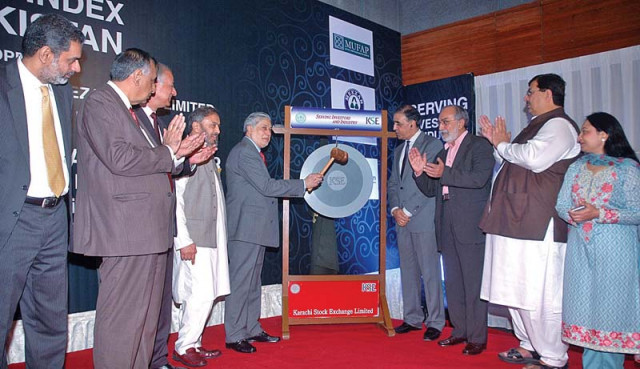Dar launches All Shares Islamic Index
Refers to positive reviews from international ratings agencies, says Saudi Arabia keen to invest

The finance minister also announced that the Pakistan Stock Exchange will start operations from January 1. PHOTO: APP
Finance Minister Ishaq Dar launched the All Shares Islamic Index amid much fanfare at the Karachi Stock Exchange (KSE) on Wednesday.
In a self-congratulatory speech replete with vows of promoting Shariah compliance in the banking and capital markets, Dar said Pakistan averted a default on international payments in 2014 despite the contrasting prediction of “world economic tsars”.
KSE recomposes Shariah-compliant stock index
“Pakistan is known as a two-tranche country, which means we run away from reforms after two levels. But we have crossed the ninth reforms level this time. This has never happened before,” Dar said while emphasising the continuation of the IMF loan programme.

Saying that the praise for Pakistan’s economic performance was not coming from “some African country” or banana republic, Dar repeatedly referred to positive reviews from international ratings agencies in his speech. He also quoted the Japan External Trade Organization (Jetro), which had said Pakistan was likely to be the second choicest place for foreign direct investment (FDI).
FDI has actually shrunk by almost one-quarter in the first four months of the current fiscal year. Net FDI in October alone came down a whopping 48.6% on a yearly basis.
Weekly review: KSE-100 plummets 911 points on regulatory concerns
“How did Singapore, China and India grow? They grew because of FDI inflows, not loans and debt,” he said, quickly adding that loans are ‘obviously’ important to sustain the economy.
He added that Saudi Arabian investors have shown “keen interest” in investing in Pakistan. In contrast with Dar’s claim, Saudi Arabian investors pulled out $42.5 million from Pakistan in the last four months alone.
The finance minister also announced that the Pakistan Stock Exchange will start operations from January 1, 2016.
Speaking on the occasion, Securities and Exchange Commission of Pakistan (SECP) Chairman Zafarul Haq Hijazi said the commission is in the process of introducing new regulatory framework for credit rating companies to ensure quality credit rating, independent management and transparency in the credit rating process.
Creating awareness: The ownership and control of Islamic banks in Pakistan
He also announced the SECP’s resolve to establish a financially and operationally independent audit oversight board for the oversight of auditors of public-interest companies for greater transparency.
New Islamic index
In order to gauge the performance of the Shariah-compliant segment of the equity market, the KSE and Meezan Bank have developed an All Shares Islamic Index, which is made up of 225 companies. All shares traded on the KSE that meet the Shariah screening criteria are included in the index.
It will reflect the performance of Shariah-compliant equities in their entirety because a separate index - KMI-30 Index - is already in place to gauge the performance of the 30 most liquid Islamic stocks.
The day-to-day maintenance of the index will be carried out within the Broad Index Policy Framework set by the KSE and Al Meezan Investments. It will be calculated and disseminated to market participants, regulators and trading screens on a real-time basis. Its re-composition will take place on a semi-annual basis.
July 2015: Most mutual funds underperform KSE-100 index
As part of the selection process, each company’s financial reports will be reviewed by research analysts of Al Meezan Investments. They will assess a company based on two broad categories, namely technical filters and Shariah-screening criteria.
There are six technical filters, such as the company should not be on the defaulters’ counter and that its securities should be available in the Central Depository System.
Shariah-screening also consists of six criteria. First and foremost of these criteria is that the core business of the company should not violate any principle of Shariah. The second condition states that the company’s interest-bearing debt to assets ratio must be less than 37%.
A company is also required to have its ratio of non-compliant investments to total assets less than 33% in order to be part of the All Shares Islamic Index.
Similarly, the ratio of non-compliant income to total revenue should also be less than 5%.
Rules also stipulate that the ratio of illiquid assets to total assets must be at least 25% while market price per share should also be at least equal to, or greater than, the net liquid assets per share.
Published in The Express Tribune, November 19th, 2015.
Like Business on Facebook, follow @TribuneBiz on Twitter to stay informed and join in the conversation.


















COMMENTS
Comments are moderated and generally will be posted if they are on-topic and not abusive.
For more information, please see our Comments FAQ